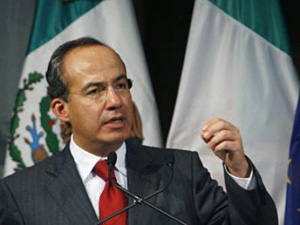
|  |  |  Editorials | Issues | October 2008 Editorials | Issues | October 2008  
Mexico Weighs a Change of Focus on Drugs
 Oscar Avila - Chicago Tribune Oscar Avila - Chicago Tribune
go to original


| | The architect of Mexico's offensive against drug traffickers, President Felipe Calderon, has sent a proposal to Congress that would decriminalize small amounts of drugs by giving those consumers the choice of treatment instead of jail time. | | |
Mexico City — Mexico has absorbed shocking drug-related slayings in recent weeks, including a popular mayor gunned down and criminals throwing grenades into a packed Independence Day celebration.

But the casualties also come in less visible forms, as Mexico copes with a surge in the number of citizens who consume drugs and become addicted.

Facing this twin threat, Mexican officials have taken a new tack this month by saying they can better target the most dangerous criminal networks by going easier on small-time consumers and addicts.

The architect of Mexico's offensive against drug traffickers, President Felipe Calderon, has sent a proposal to Congress that would decriminalize small amounts of drugs by giving those consumers the choice of treatment instead of jail time. Authorities hope the change would free up resources to go after higher-level criminals.

The speaker of Mexico City's legislative assembly has gone even further, saying he wants to turn the capital into another Amsterdam by legalizing small sales of marijuana, which he calls a "soft drug" currently controlled by criminals.

The proposals have ignited a national debate over the effectiveness of Calderon's strategy, which has dispatched tens of thousands of soldiers and federal police into hot spots. With the offensive well into its second year, Reforma newspaper estimated about 3,600 deaths related to organized crime so far in 2008, on pace to shatter last year's total.

Despite the climb in violence, the director of U.S. anti-drug policy on Friday gave some of the strongest words of support by a U.S. official in backing Mexico's battle against those involved in the drug trade.

"There's only two ways this goes: They either surrender to law enforcement or they die," John Walters, the U.S. "drug czar," told foreign reporters in Mexico City.

Walters even said Calderon's proposal to decriminalize drugs was acceptable, likening it to U.S. courts that sentence small-time consumers to drug treatment.

That statement of support shows how much the U.S. is depending on Calderon to stem the northward flow of drugs while tamping down on a wave of killings and kidnappings that has spilled into U.S. border states. The U.S. plans to finalize a $450 million package of aid and equipment this week.

By contrast, pressure from the U.S. caused former President Vicente Fox to withdraw a proposal in 2006 that would have decriminalized small levels of drug possession.

Calderon's proposal—part of a larger security blueprint—would eliminate punishment for those carrying up to about a tenth of an ounce of marijuana and even smaller amounts of cocaine and methamphetamine considered for "personal use." To qualify, they would have to complete treatment programs.

At the same time, Calderon proposed stricter penalties for those selling drugs to minors.

Experts say more drugs are staying in Mexico as the government uses force to interrupt smuggling routes.

The Mexican Health Ministry reports about 465,000 addicts in Mexico, up 52 percent from 2000. About 4.5 million Mexicans had tried illegal drugs, up 29 percent.

Walters said reducing consumption remains a key priority on both sides of the border. But several U.S. and Mexican analysts say the rising rate of consumption shows that the anti-drug collaboration between the two countries has been poorly focused.

In a recent newspaper column, influential commentator Sergio Sarmiento took issue with government claims that Mexico's war against drug rings has been a triumph.

"It depends how we define 'triumph,' " he wrote. "There is another indicator that suggests we are losing the war, and that is that the number of users has increased."

In the local assembly in Mexico City, Speaker Victor Hugo Cirigo has called Calderon's strategy a failure, prompting him to make an even more ambitious proposal that would let Mexicans grow up to five marijuana plants in their homes and even purchase small amounts.

The proposal is considered a long shot. Many in Cirigo's own leftist Democratic Revolutionary Party have rejected it. U.S. officials have said legalization will not work.

But Cirigo insisted that legalizing marijuana would send prices downward and "hit criminals where it hurts: their finances." He also hoped to poke a hole in Calderon's approach.

"That was my intention, to move society to examine the poor results of the chief executive," Cirigo said. "We see many kidnappings, many decapitated, many killed. But we don't see many tangible results."

oavila(at)tribune.com |

 |
|  |



